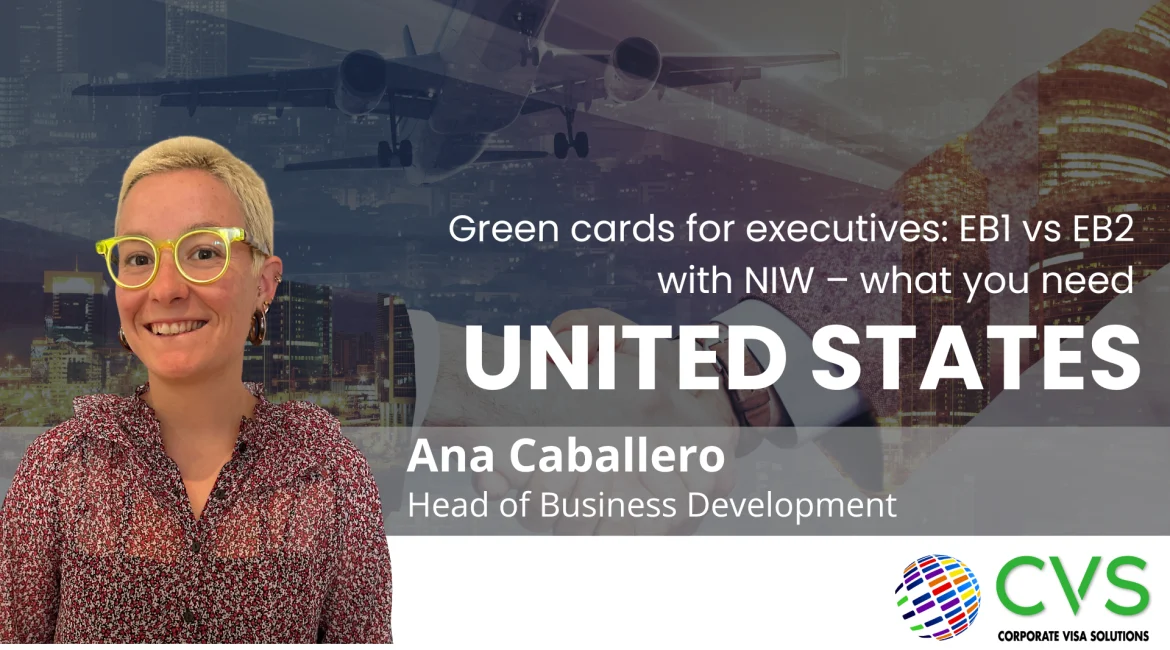When it comes to securing permanent residence in the United States, and get a US visa, understanding the difference between the EB1 vs EB2 visa categories is crucial — especially for executives and senior professionals.
Each path has unique advantages, requirements, and strategic implications for UK companies expanding into the U.S. or relocating leadership.
In this article, we’ll break down the two categories, clarify when each one applies, and help you determine the most effective route for your business mobility goals.
Executive green card options: Which one fits?
If you’re relocating senior talent — such as country managers, directors, or high-level project leads — the executive green card options typically fall under EB1 or EB2 with National Interest Waiver (NIW). Both lead to permanent residency, but the process and criteria vary significantly.
The EB1 (specifically the EB1C subcategory) is designed for multinational executives and managers who have worked for a foreign affiliate of a U.S. company for at least one of the past three years. It’s often the natural next step for those who first entered the U.S. under an L1A visa.
The EB2 with NIW, on the other hand, is a strong choice for professionals with exceptional ability or advanced degrees — especially if their work benefits the U.S. economy or public interest.
EB2 requirements: Who qualifies for a national interest waiver?
The EB2 category typically requires a U.S. employer to sponsor the applicant through a process called PERM Labor Certification. However, the NIW (National Interest Waiver) removes that requirement, as long as the applicant demonstrates that their work serves a national interest.
To qualify for an EB2 with NIW, a UK executive or expert must show:
- An advanced degree (master’s or higher), or exceptional ability in business, science, or technology
- That their proposed activity in the U.S. has substantial merit and national importance
- That they are well-positioned to succeed
- That the U.S. would benefit by waiving the job offer and labor certification requirements
This path is often used by entrepreneurs, technical leaders, or strategic consultants in fields like renewable energy, engineering, infrastructure, or innovation.
EB1 vs EB2 visa: What’s the real difference?
Let’s look at a side-by-side comparison of EB1 vs EB2 visa categories to understand the practical implications:
Feature | EB1C (Multinational Exec) | EB2 with NIW |
|---|---|---|
Sponsorship Required | Yes (U.S. company sponsor) | No (self-petition possible with NIW) |
PERM Labor Certification | Not required | Not required with NIW |
Timeline | Often faster (especially if inside U.S.) | Variable, but often longer |
Path from L1A | Natural progression | Not linked directly |
Best for… | C-level executives, directors | Experts, founders, strategic professionals |
Both categories allow the applicant’s spouse and children under 21 to apply for Green Cards as dependents.
Which one should you choose?
Choosing between EB1 vs EB2 visa depends on:
- The candidate’s current visa status (L1A vs non-immigrant)
- Their role and scope of responsibility in the company
- The company’s structure and U.S. presence
- The urgency and timeline of the relocation
- Whether the executive has academic credentials or a technical background
For example:
- A UK-based managing director transferred to a U.S. subsidiary will likely qualify for EB1C.
- A technical founder or sector expert launching a renewable energy project in Texas may be better suited for EB2 with NIW.
How Corporate Visa Solutions can help
At Corporate Visa Solutions, we work with UK companies to navigate the full U.S. immigration process — from L1 and E2 visas to Green Cards like EB1 and EB2 with NIW.
We operate from Europe, in your timezone, and guide you through the complexities of U.S. immigration.




